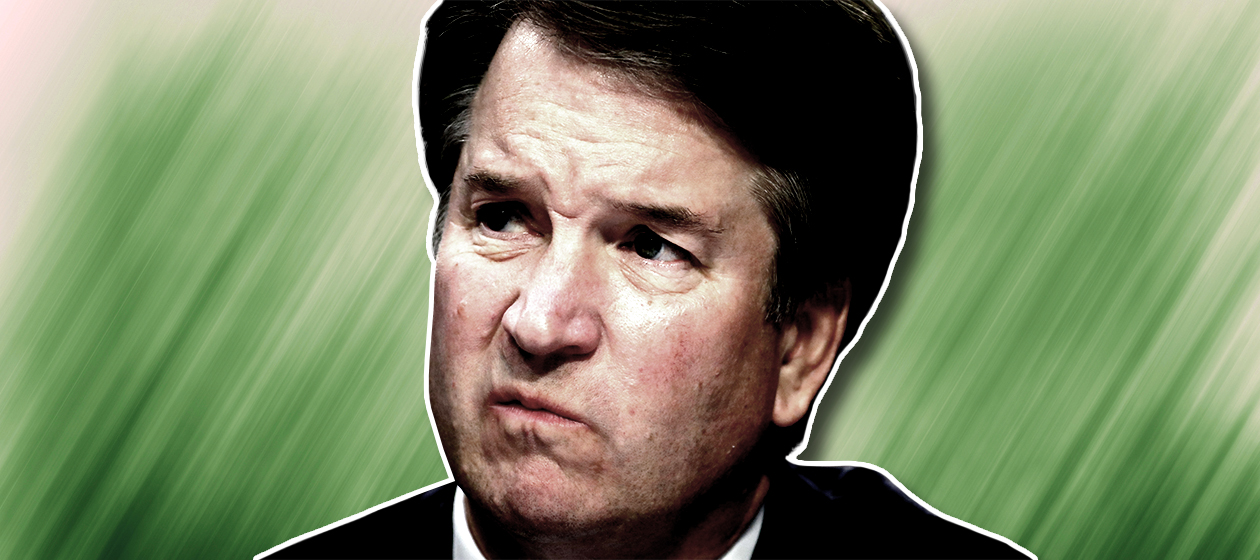Brett Kavanaugh is in the wrong branch of government
Brett Kavanaugh is partisan, prevaricating, and ill-tempered. Maybe he should be in Congress.


A free daily email with the biggest news stories of the day – and the best features from TheWeek.com
You are now subscribed
Your newsletter sign-up was successful
Brett Kavanaugh faces the unenviable task of proving he's not a binge-drinking rapist. So far, he has acquitted himself poorly.
In the embattled Supreme Court nominee's first hearing before the Senate Judiciary Committee, the one you probably didn't watch, Kavanaugh defined a "good judge" as "a neutral and impartial arbiter who favors no litigant or policy." He fell short of this standard at his second hearing, the one where he cried and declared his love of beer.
Kavanaugh also lambasted "Democratic" politicians, "the Clintons," and "the left." He responded to an inquiry from Sen. Dick Durbin (D-Ill.) by calling it "a phony question." When asked by Sen. Sheldon Whitehouse (D-R.I.) about his drinking, he offered phony questions of his own: "Do you like beer? What do you like to drink? Senator, what do you like to drink?" Asked by Sen. Amy Klobuchar (D-Minn.) if he had ever blacked out while drinking, he replied, "Have you?" To millions of viewers, Kavanaugh came across as ruder and more partisan than the elected partisans interrogating him.
The Week
Escape your echo chamber. Get the facts behind the news, plus analysis from multiple perspectives.

Sign up for The Week's Free Newsletters
From our morning news briefing to a weekly Good News Newsletter, get the best of The Week delivered directly to your inbox.
From our morning news briefing to a weekly Good News Newsletter, get the best of The Week delivered directly to your inbox.
If the sexual assault allegations about him are completely false, his anger is understandable — but also disqualifying. Just as presidents should be presidential, justices should be judicious in public forums.
They should also be honest. As Slate's William Saletan tabulated, Kavanaugh lied repeatedly during his testimony. Admittedly, telling the truth about your shenanigans in high school is embarrassing, not to mention immaterial to your juridical credentials. But it isn't difficult. I shoplifted air freshener from a grocery store, had a 2.0 G.P.A., and wore a chain wallet — all, not coincidentally, in the same year. For these reasons, I have a better chance of landing a job at a food court than on the Supreme Court, and rightly so.
In his opening statement last week, Kavanaugh said, "I ask you to judge me by the standard you would want applied to your father, your husband, your brother, or your son." No, actually, we should judge him by the standard we want applied to a Supreme Court justice. This is a high standard. To qualify, you have to be better, vastly better, than future Sbarro employees like me.
"There can be but few men in the society, who will have sufficient skill in the laws to qualify them for the stations of judges," Alexander Hamilton wrote. "And making the proper deductions for the ordinary depravity of human nature, the number must be still smaller, of those who unite the requisite integrity with the requisite knowledge." Out of 325.7 million Americans, only 0.00000003 percent are on the Supreme Court. There have only been 113 Supreme Court justices ever. Should this guy really be one of them?
A free daily email with the biggest news stories of the day – and the best features from TheWeek.com
We have reason to question Kavanaugh's integrity, not because of his youthful indiscretions but because of how he has addressed them. Last week, he portrayed his younger self as studious, charitable, church-going, and definitely not an assaulter of women. He bristled at the suggestion that he drank excessively. But in a letter he wrote in 1983 (obtained by The New York Times this week), Kavanaugh referred to himself and his friends as "loud, obnoxious drunks" and "prolific pukers." The more we learn about Brett Kavanaugh in the 1980s, the more he sounds like Bret Michaels in the 1980s. Justice is supposed to be blind, not blind drunk.
But his drinking is not the issue — his lack of candor is. That he has been less than forthright about his past raises questions about his character. Among them: If normal people can judge him harshly, why should they accede to him the power to judge them?
Of the three branches of government, the judiciary is the least democratic and the most esteemed. But it is in danger of becoming no different than the other two. Judicial confirmations are increasingly conducted like political campaigns, with bus tours, TV ads, and TV interviews. Whereas Congress and the presidency derive their legitimacy from elections, judicial legitimacy stems from its prestige. Perceptions of its impartiality and fairness are its validation. "The Supreme Court must never be viewed as a partisan institution," Kavanaugh himself said (at his first hearing).
If Kavanaugh is confirmed, he will be viewed as a partisan, celebrated by conservatives, derided by liberals, and regarded with suspicion by everyone else. This may be unfair to Kavanaugh, but public service often is.
Kavanaugh doesn't have to be a sexual predator or an alcoholic to disqualify him from the Supreme Court. He just has to be less than impeccable. In the past week, he has proven to be disappointingly human. He is partisan, contemptuous of his critics, self-righteous, prevaricating, ill-tempered, and ridden with personal ambition.
He's in the wrong branch of government.
Windsor Mann is the editor of The Quotable Hitchens: From Alcohol to Zionism.
-
 Bad Bunny’s Super Bowl: A win for unity
Bad Bunny’s Super Bowl: A win for unityFeature The global superstar's halftime show was a celebration for everyone to enjoy
-
 Book reviews: ‘Bonfire of the Murdochs’ and ‘The Typewriter and the Guillotine’
Book reviews: ‘Bonfire of the Murdochs’ and ‘The Typewriter and the Guillotine’Feature New insights into the Murdoch family’s turmoil and a renowned journalist’s time in pre-World War II Paris
-
 Witkoff and Kushner tackle Ukraine, Iran in Geneva
Witkoff and Kushner tackle Ukraine, Iran in GenevaSpeed Read Steve Witkoff and Jared Kushner held negotiations aimed at securing a nuclear deal with Iran and an end to Russia’s war in Ukraine
-
 The billionaires’ wealth tax: a catastrophe for California?
The billionaires’ wealth tax: a catastrophe for California?Talking Point Peter Thiel and Larry Page preparing to change state residency
-
 Bari Weiss’ ‘60 Minutes’ scandal is about more than one report
Bari Weiss’ ‘60 Minutes’ scandal is about more than one reportIN THE SPOTLIGHT By blocking an approved segment on a controversial prison holding US deportees in El Salvador, the editor-in-chief of CBS News has become the main story
-
 Has Zohran Mamdani shown the Democrats how to win again?
Has Zohran Mamdani shown the Democrats how to win again?Today’s Big Question New York City mayoral election touted as victory for left-wing populists but moderate centrist wins elsewhere present more complex path for Democratic Party
-
 Millions turn out for anti-Trump ‘No Kings’ rallies
Millions turn out for anti-Trump ‘No Kings’ ralliesSpeed Read An estimated 7 million people participated, 2 million more than at the first ‘No Kings’ protest in June
-
 Ghislaine Maxwell: angling for a Trump pardon
Ghislaine Maxwell: angling for a Trump pardonTalking Point Convicted sex trafficker's testimony could shed new light on president's links to Jeffrey Epstein
-
 The last words and final moments of 40 presidents
The last words and final moments of 40 presidentsThe Explainer Some are eloquent quotes worthy of the holders of the highest office in the nation, and others... aren't
-
 The JFK files: the truth at last?
The JFK files: the truth at last?In The Spotlight More than 64,000 previously classified documents relating the 1963 assassination of John F. Kennedy have been released by the Trump administration
-
 'Seriously, not literally': how should the world take Donald Trump?
'Seriously, not literally': how should the world take Donald Trump?Today's big question White House rhetoric and reality look likely to become increasingly blurred
